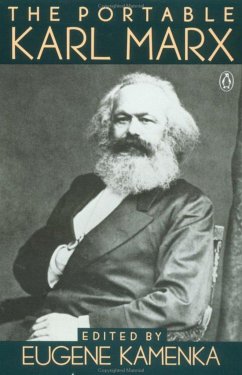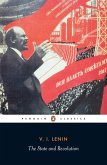Karl Marx
The Portable Karl Marx
Karl Marx
The Portable Karl Marx
- Broschiertes Buch
- Merkliste
- Auf die Merkliste
- Bewerten Bewerten
- Teilen
- Produkt teilen
- Produkterinnerung
- Produkterinnerung
Presents an overview of the life and thoughts of Karl Marx. This book weaves together Marx's published works and letters into a tapestry of history and ideas. It also features tidbits from Marx's hand that help you understand the man and the history of his ideology, including his predictions on the fates of France and Russia.
Andere Kunden interessierten sich auch für
![The Communist Manifesto The Communist Manifesto]() Friedrich EngelsThe Communist Manifesto14,99 €
Friedrich EngelsThe Communist Manifesto14,99 €![Early Writings Early Writings]() Karl MarxEarly Writings14,99 €
Karl MarxEarly Writings14,99 €![Capital Capital]() Karl MarxCapital28,99 €
Karl MarxCapital28,99 €![The State and Revolution The State and Revolution]() Vladimir LeninThe State and Revolution18,99 €
Vladimir LeninThe State and Revolution18,99 €![Grundrisse Grundrisse]() Karl MarxGrundrisse27,99 €
Karl MarxGrundrisse27,99 €![Dispatches for the New York Tribune Dispatches for the New York Tribune]() Karl MarxDispatches for the New York Tribune14,99 €
Karl MarxDispatches for the New York Tribune14,99 €![The Origin of the Family, Private Property and the State The Origin of the Family, Private Property and the State]() Friedrich EngelsThe Origin of the Family, Private Property and the State21,99 €
Friedrich EngelsThe Origin of the Family, Private Property and the State21,99 €-
-
-
Presents an overview of the life and thoughts of Karl Marx. This book weaves together Marx's published works and letters into a tapestry of history and ideas. It also features tidbits from Marx's hand that help you understand the man and the history of his ideology, including his predictions on the fates of France and Russia.
Hinweis: Dieser Artikel kann nur an eine deutsche Lieferadresse ausgeliefert werden.
Hinweis: Dieser Artikel kann nur an eine deutsche Lieferadresse ausgeliefert werden.
Produktdetails
- Produktdetails
- Verlag: Penguin Books Ltd
- Seitenzahl: 722
- Erscheinungstermin: 31. März 1983
- Englisch
- Abmessung: 197mm x 129mm x 39mm
- Gewicht: 492g
- ISBN-13: 9780140150964
- ISBN-10: 014015096X
- Artikelnr.: 29244109
- Herstellerkennzeichnung
- Libri GmbH
- Europaallee 1
- 36244 Bad Hersfeld
- gpsr@libri.de
- Verlag: Penguin Books Ltd
- Seitenzahl: 722
- Erscheinungstermin: 31. März 1983
- Englisch
- Abmessung: 197mm x 129mm x 39mm
- Gewicht: 492g
- ISBN-13: 9780140150964
- ISBN-10: 014015096X
- Artikelnr.: 29244109
- Herstellerkennzeichnung
- Libri GmbH
- Europaallee 1
- 36244 Bad Hersfeld
- gpsr@libri.de
Karl Marx (1818-1883) Karl Marx was a German philosopher, revolutionary, historian, sociologist, economist, and political theorist. Perhaps the most zealous intellectual advocate of communism, Marx was a proponent of ideas that were considered too radical for the time he lived in. Due to his political works, he was exiled from Germany and rendered stateless. Thereafter, he moved to London with his family, and continued to collaborate with Engels on path-breaking works, such as The Communist Manifesto and Das Kapital. Marx advocated for the socialist mode of production, as opposed to the capitalist mode, where the means of production is controlled by the ruling class. He believed that the working class could topple the capitalist system through a proletariat revolution that would establish a classless, communist society. While Marx's ideologies have been both appreciated and criticized, there is no doubt that his works and ideas have heavily influenced subsequent economic and political thought and history. Friedrich Engels (1820-1895) Friedrich Engels was a German philosopher, revolutionary, socialist, historian, political theorist, activist, as well as economist. Along with Karl Marx, he developed the principles of what is now known as Marxism. He was a staunch critic of the capitalist society, and instead saw a space for a just and equal society in socialism. His works are a critical commentary on social structures, such as religion, and systems of governance, which thrive as a result of the oppression of marginalized sections in society. In The Condition of Working Class in England, Engels studies the condition of the working class that worsened due to the Industrial Revolution (1760-1840). The work deeply influenced British historians of the time. Although he co-authored several texts with Marx, he edited and compiled Marx's unfinished works as well, while also continuing to publish his own.
Introduction
Bibliographical Note and Acknowledgments
Chronology: Marx's Life
Chronology: Marx's Chief Works
I. Marx the Man: Documents, Letters, and Reminiscences
[Birth Certificate]
Certificate of Matriculation of a Pupil at the High School at Trier
[Marx's Record of Studies Issued by the University of Bonn]
[From Marx's Sister Sophie]
[Heinrich Marx to His Son]
[Karl Marx to His Father]
[Heinrich Marx to His Son]
[Bruno Bruno Bauer to Marx]
[Marx's Record of Studies in the University of Berlin]
[Letter of Professor C. F. Bachmann, Dean of the Faculty of Philosophy in
the University of Jena, Presenting Marx's Doctoral Thesis to the Faculty
for Consideration]
[Moses Hess on Karl Marx]
[Marx to Arnold Ruge]
[Marx to Arnold Ruge]
[Jenny von Westphalen to Marx]
[Arnold Ruge to Ludwig Feuerbach on Marx]
[Bakunin's Reminiscence]
[P. Annenkov: Karl Marx in 1846]
[Marx to Engels in Paris]
[Carl Schurz on Marx in Cologne Summer 1848]
[Marx to Engels in Brussels]
[Marx to Engels in Lausanne]
[Marx to Engels in Lausanne]
[Jenny Marx to Joseph Weydemeyer]
[Gustave Techow to a Friend]
[Marx to Engels]
[Marx to Engels]
[A Prussian Police Agent's Report]
[Marx to Engels]
[Marx to Engels]
[Marx to Engels]
[Karl Marx to His Wife]
[Marx to Engels]
[Marx to Engels]
[Eleanor Marx on Her Father]
[Marx to Engels in Manchester]
[Confessions of Marx]
[Karl Marx to Laura Marx]
[Karl Marx to François Lafargue]
[Karl Marx to Paul Lafargue]
[From R. Landor's Interview with Marx]
[Report on Karl Marx in Karlsbad]
[From the Chicago Tribune's Interview with Marx]
[Sir Mountstuart Elphinstone Grant-Duff to Empress Frederick]
[Karl Marx to Laura Lafargue]
[Engels's Speech at the Graveside of Karl Marx]
II. Karl Marx's Writings
1. The Formation of a Young Radical: Early Writings, 1841-1844
From Doctoral Dissertation, The Difference between the Democritean and the
Epicurean Philosophy of Nature
"The Draft Divorce Law"
From the Kreuznach Manuscripts: Critique of Hegel's Philosophy of Right
From a Correspondence of 1843
From "On the Jewish Questions"
From "Contribution to the Critique of Hegel's Philosophy of Right:
Introduction"
2. Beyond Philosophy to Communism, Political Economy, and the Materialist
Conception of History: Transitional Writings, 1844-1847
From Economico-Philosophical Manuscripts of 1844
From the First Manuscript: "Alienated Labor"
From the Third Manuscript: "Private Property and Communism"
From "Critical Notes on the Article 'The King of Prussia and Social Reform.
By a Prussian""
"Theses on Feuerbach"
From A Contribution to the Critique of Political Economy
From The German Ideology, Volume One:
Preface
[The Materialist Conception of History]
[On History]
[Consciousness and the Division of Labour]
[Law and the Materialist Conception of History]
[The Role of Violence in History]
[Communism as the End of History]
3. Revolution and Counter-Revolution: Political Writings, 1848-1852
Manifesto of the Communist Party
The Demands of the Communist Party in Germany
Address of the Central Committee to the Communist League
From The Class Struggles in France: 1848 to 1850
From The Eighteenth Brumaire of Louis Bonaparte
4. Journalism and Politics: 1853-1864
The British Rule in India
From "The Future Results of British Rule in India"
Revolution in China and in Europe
The Indian Revolt
Inaugural Address and Provisional Rules of the International Working Men's
Association
5. "Wading Through Economic Filth": Economic Writings, 1857-1867
From Grundrisse, Introduction
From Value, Price and Profit
From Capital, Volume I:
From the Preface to the First German Edition
Chapter 1: "Commodities"
Chapter 26: "The Secret of Primitive Accumulation"
From Chapter 27: "The Expropriation of the Agricultural Population from the
Land"
Chapter 31: "The Genesis of the Industrial Capitalist"
Chapter 32: "The Historical Tendency of Capitalist Accumulation"
Chapter 33: "The Modern Theory of Colonisation"
6. The Paris Commune and the Future of Socialism: 1870-1882
From The Civil War in France
:Address of the General Council of the International Working Men's
Association
From the First Draft: "The Character of the Commune"
Marginal Notes to the Programme of the German Workers' Party [Critique of
the Gotha Programme]
Preface to the Russian Edition of the Communist Manifesto
Reader's Guide
Index
Bibliographical Note and Acknowledgments
Chronology: Marx's Life
Chronology: Marx's Chief Works
I. Marx the Man: Documents, Letters, and Reminiscences
[Birth Certificate]
Certificate of Matriculation of a Pupil at the High School at Trier
[Marx's Record of Studies Issued by the University of Bonn]
[From Marx's Sister Sophie]
[Heinrich Marx to His Son]
[Karl Marx to His Father]
[Heinrich Marx to His Son]
[Bruno Bruno Bauer to Marx]
[Marx's Record of Studies in the University of Berlin]
[Letter of Professor C. F. Bachmann, Dean of the Faculty of Philosophy in
the University of Jena, Presenting Marx's Doctoral Thesis to the Faculty
for Consideration]
[Moses Hess on Karl Marx]
[Marx to Arnold Ruge]
[Marx to Arnold Ruge]
[Jenny von Westphalen to Marx]
[Arnold Ruge to Ludwig Feuerbach on Marx]
[Bakunin's Reminiscence]
[P. Annenkov: Karl Marx in 1846]
[Marx to Engels in Paris]
[Carl Schurz on Marx in Cologne Summer 1848]
[Marx to Engels in Brussels]
[Marx to Engels in Lausanne]
[Marx to Engels in Lausanne]
[Jenny Marx to Joseph Weydemeyer]
[Gustave Techow to a Friend]
[Marx to Engels]
[Marx to Engels]
[A Prussian Police Agent's Report]
[Marx to Engels]
[Marx to Engels]
[Marx to Engels]
[Karl Marx to His Wife]
[Marx to Engels]
[Marx to Engels]
[Eleanor Marx on Her Father]
[Marx to Engels in Manchester]
[Confessions of Marx]
[Karl Marx to Laura Marx]
[Karl Marx to François Lafargue]
[Karl Marx to Paul Lafargue]
[From R. Landor's Interview with Marx]
[Report on Karl Marx in Karlsbad]
[From the Chicago Tribune's Interview with Marx]
[Sir Mountstuart Elphinstone Grant-Duff to Empress Frederick]
[Karl Marx to Laura Lafargue]
[Engels's Speech at the Graveside of Karl Marx]
II. Karl Marx's Writings
1. The Formation of a Young Radical: Early Writings, 1841-1844
From Doctoral Dissertation, The Difference between the Democritean and the
Epicurean Philosophy of Nature
"The Draft Divorce Law"
From the Kreuznach Manuscripts: Critique of Hegel's Philosophy of Right
From a Correspondence of 1843
From "On the Jewish Questions"
From "Contribution to the Critique of Hegel's Philosophy of Right:
Introduction"
2. Beyond Philosophy to Communism, Political Economy, and the Materialist
Conception of History: Transitional Writings, 1844-1847
From Economico-Philosophical Manuscripts of 1844
From the First Manuscript: "Alienated Labor"
From the Third Manuscript: "Private Property and Communism"
From "Critical Notes on the Article 'The King of Prussia and Social Reform.
By a Prussian""
"Theses on Feuerbach"
From A Contribution to the Critique of Political Economy
From The German Ideology, Volume One:
Preface
[The Materialist Conception of History]
[On History]
[Consciousness and the Division of Labour]
[Law and the Materialist Conception of History]
[The Role of Violence in History]
[Communism as the End of History]
3. Revolution and Counter-Revolution: Political Writings, 1848-1852
Manifesto of the Communist Party
The Demands of the Communist Party in Germany
Address of the Central Committee to the Communist League
From The Class Struggles in France: 1848 to 1850
From The Eighteenth Brumaire of Louis Bonaparte
4. Journalism and Politics: 1853-1864
The British Rule in India
From "The Future Results of British Rule in India"
Revolution in China and in Europe
The Indian Revolt
Inaugural Address and Provisional Rules of the International Working Men's
Association
5. "Wading Through Economic Filth": Economic Writings, 1857-1867
From Grundrisse, Introduction
From Value, Price and Profit
From Capital, Volume I:
From the Preface to the First German Edition
Chapter 1: "Commodities"
Chapter 26: "The Secret of Primitive Accumulation"
From Chapter 27: "The Expropriation of the Agricultural Population from the
Land"
Chapter 31: "The Genesis of the Industrial Capitalist"
Chapter 32: "The Historical Tendency of Capitalist Accumulation"
Chapter 33: "The Modern Theory of Colonisation"
6. The Paris Commune and the Future of Socialism: 1870-1882
From The Civil War in France
:Address of the General Council of the International Working Men's
Association
From the First Draft: "The Character of the Commune"
Marginal Notes to the Programme of the German Workers' Party [Critique of
the Gotha Programme]
Preface to the Russian Edition of the Communist Manifesto
Reader's Guide
Index
Introduction
Bibliographical Note and Acknowledgments
Chronology: Marx's Life
Chronology: Marx's Chief Works
I. Marx the Man: Documents, Letters, and Reminiscences
[Birth Certificate]
Certificate of Matriculation of a Pupil at the High School at Trier
[Marx's Record of Studies Issued by the University of Bonn]
[From Marx's Sister Sophie]
[Heinrich Marx to His Son]
[Karl Marx to His Father]
[Heinrich Marx to His Son]
[Bruno Bruno Bauer to Marx]
[Marx's Record of Studies in the University of Berlin]
[Letter of Professor C. F. Bachmann, Dean of the Faculty of Philosophy in
the University of Jena, Presenting Marx's Doctoral Thesis to the Faculty
for Consideration]
[Moses Hess on Karl Marx]
[Marx to Arnold Ruge]
[Marx to Arnold Ruge]
[Jenny von Westphalen to Marx]
[Arnold Ruge to Ludwig Feuerbach on Marx]
[Bakunin's Reminiscence]
[P. Annenkov: Karl Marx in 1846]
[Marx to Engels in Paris]
[Carl Schurz on Marx in Cologne Summer 1848]
[Marx to Engels in Brussels]
[Marx to Engels in Lausanne]
[Marx to Engels in Lausanne]
[Jenny Marx to Joseph Weydemeyer]
[Gustave Techow to a Friend]
[Marx to Engels]
[Marx to Engels]
[A Prussian Police Agent's Report]
[Marx to Engels]
[Marx to Engels]
[Marx to Engels]
[Karl Marx to His Wife]
[Marx to Engels]
[Marx to Engels]
[Eleanor Marx on Her Father]
[Marx to Engels in Manchester]
[Confessions of Marx]
[Karl Marx to Laura Marx]
[Karl Marx to François Lafargue]
[Karl Marx to Paul Lafargue]
[From R. Landor's Interview with Marx]
[Report on Karl Marx in Karlsbad]
[From the Chicago Tribune's Interview with Marx]
[Sir Mountstuart Elphinstone Grant-Duff to Empress Frederick]
[Karl Marx to Laura Lafargue]
[Engels's Speech at the Graveside of Karl Marx]
II. Karl Marx's Writings
1. The Formation of a Young Radical: Early Writings, 1841-1844
From Doctoral Dissertation, The Difference between the Democritean and the
Epicurean Philosophy of Nature
"The Draft Divorce Law"
From the Kreuznach Manuscripts: Critique of Hegel's Philosophy of Right
From a Correspondence of 1843
From "On the Jewish Questions"
From "Contribution to the Critique of Hegel's Philosophy of Right:
Introduction"
2. Beyond Philosophy to Communism, Political Economy, and the Materialist
Conception of History: Transitional Writings, 1844-1847
From Economico-Philosophical Manuscripts of 1844
From the First Manuscript: "Alienated Labor"
From the Third Manuscript: "Private Property and Communism"
From "Critical Notes on the Article 'The King of Prussia and Social Reform.
By a Prussian""
"Theses on Feuerbach"
From A Contribution to the Critique of Political Economy
From The German Ideology, Volume One:
Preface
[The Materialist Conception of History]
[On History]
[Consciousness and the Division of Labour]
[Law and the Materialist Conception of History]
[The Role of Violence in History]
[Communism as the End of History]
3. Revolution and Counter-Revolution: Political Writings, 1848-1852
Manifesto of the Communist Party
The Demands of the Communist Party in Germany
Address of the Central Committee to the Communist League
From The Class Struggles in France: 1848 to 1850
From The Eighteenth Brumaire of Louis Bonaparte
4. Journalism and Politics: 1853-1864
The British Rule in India
From "The Future Results of British Rule in India"
Revolution in China and in Europe
The Indian Revolt
Inaugural Address and Provisional Rules of the International Working Men's
Association
5. "Wading Through Economic Filth": Economic Writings, 1857-1867
From Grundrisse, Introduction
From Value, Price and Profit
From Capital, Volume I:
From the Preface to the First German Edition
Chapter 1: "Commodities"
Chapter 26: "The Secret of Primitive Accumulation"
From Chapter 27: "The Expropriation of the Agricultural Population from the
Land"
Chapter 31: "The Genesis of the Industrial Capitalist"
Chapter 32: "The Historical Tendency of Capitalist Accumulation"
Chapter 33: "The Modern Theory of Colonisation"
6. The Paris Commune and the Future of Socialism: 1870-1882
From The Civil War in France
:Address of the General Council of the International Working Men's
Association
From the First Draft: "The Character of the Commune"
Marginal Notes to the Programme of the German Workers' Party [Critique of
the Gotha Programme]
Preface to the Russian Edition of the Communist Manifesto
Reader's Guide
Index
Bibliographical Note and Acknowledgments
Chronology: Marx's Life
Chronology: Marx's Chief Works
I. Marx the Man: Documents, Letters, and Reminiscences
[Birth Certificate]
Certificate of Matriculation of a Pupil at the High School at Trier
[Marx's Record of Studies Issued by the University of Bonn]
[From Marx's Sister Sophie]
[Heinrich Marx to His Son]
[Karl Marx to His Father]
[Heinrich Marx to His Son]
[Bruno Bruno Bauer to Marx]
[Marx's Record of Studies in the University of Berlin]
[Letter of Professor C. F. Bachmann, Dean of the Faculty of Philosophy in
the University of Jena, Presenting Marx's Doctoral Thesis to the Faculty
for Consideration]
[Moses Hess on Karl Marx]
[Marx to Arnold Ruge]
[Marx to Arnold Ruge]
[Jenny von Westphalen to Marx]
[Arnold Ruge to Ludwig Feuerbach on Marx]
[Bakunin's Reminiscence]
[P. Annenkov: Karl Marx in 1846]
[Marx to Engels in Paris]
[Carl Schurz on Marx in Cologne Summer 1848]
[Marx to Engels in Brussels]
[Marx to Engels in Lausanne]
[Marx to Engels in Lausanne]
[Jenny Marx to Joseph Weydemeyer]
[Gustave Techow to a Friend]
[Marx to Engels]
[Marx to Engels]
[A Prussian Police Agent's Report]
[Marx to Engels]
[Marx to Engels]
[Marx to Engels]
[Karl Marx to His Wife]
[Marx to Engels]
[Marx to Engels]
[Eleanor Marx on Her Father]
[Marx to Engels in Manchester]
[Confessions of Marx]
[Karl Marx to Laura Marx]
[Karl Marx to François Lafargue]
[Karl Marx to Paul Lafargue]
[From R. Landor's Interview with Marx]
[Report on Karl Marx in Karlsbad]
[From the Chicago Tribune's Interview with Marx]
[Sir Mountstuart Elphinstone Grant-Duff to Empress Frederick]
[Karl Marx to Laura Lafargue]
[Engels's Speech at the Graveside of Karl Marx]
II. Karl Marx's Writings
1. The Formation of a Young Radical: Early Writings, 1841-1844
From Doctoral Dissertation, The Difference between the Democritean and the
Epicurean Philosophy of Nature
"The Draft Divorce Law"
From the Kreuznach Manuscripts: Critique of Hegel's Philosophy of Right
From a Correspondence of 1843
From "On the Jewish Questions"
From "Contribution to the Critique of Hegel's Philosophy of Right:
Introduction"
2. Beyond Philosophy to Communism, Political Economy, and the Materialist
Conception of History: Transitional Writings, 1844-1847
From Economico-Philosophical Manuscripts of 1844
From the First Manuscript: "Alienated Labor"
From the Third Manuscript: "Private Property and Communism"
From "Critical Notes on the Article 'The King of Prussia and Social Reform.
By a Prussian""
"Theses on Feuerbach"
From A Contribution to the Critique of Political Economy
From The German Ideology, Volume One:
Preface
[The Materialist Conception of History]
[On History]
[Consciousness and the Division of Labour]
[Law and the Materialist Conception of History]
[The Role of Violence in History]
[Communism as the End of History]
3. Revolution and Counter-Revolution: Political Writings, 1848-1852
Manifesto of the Communist Party
The Demands of the Communist Party in Germany
Address of the Central Committee to the Communist League
From The Class Struggles in France: 1848 to 1850
From The Eighteenth Brumaire of Louis Bonaparte
4. Journalism and Politics: 1853-1864
The British Rule in India
From "The Future Results of British Rule in India"
Revolution in China and in Europe
The Indian Revolt
Inaugural Address and Provisional Rules of the International Working Men's
Association
5. "Wading Through Economic Filth": Economic Writings, 1857-1867
From Grundrisse, Introduction
From Value, Price and Profit
From Capital, Volume I:
From the Preface to the First German Edition
Chapter 1: "Commodities"
Chapter 26: "The Secret of Primitive Accumulation"
From Chapter 27: "The Expropriation of the Agricultural Population from the
Land"
Chapter 31: "The Genesis of the Industrial Capitalist"
Chapter 32: "The Historical Tendency of Capitalist Accumulation"
Chapter 33: "The Modern Theory of Colonisation"
6. The Paris Commune and the Future of Socialism: 1870-1882
From The Civil War in France
:Address of the General Council of the International Working Men's
Association
From the First Draft: "The Character of the Commune"
Marginal Notes to the Programme of the German Workers' Party [Critique of
the Gotha Programme]
Preface to the Russian Edition of the Communist Manifesto
Reader's Guide
Index








